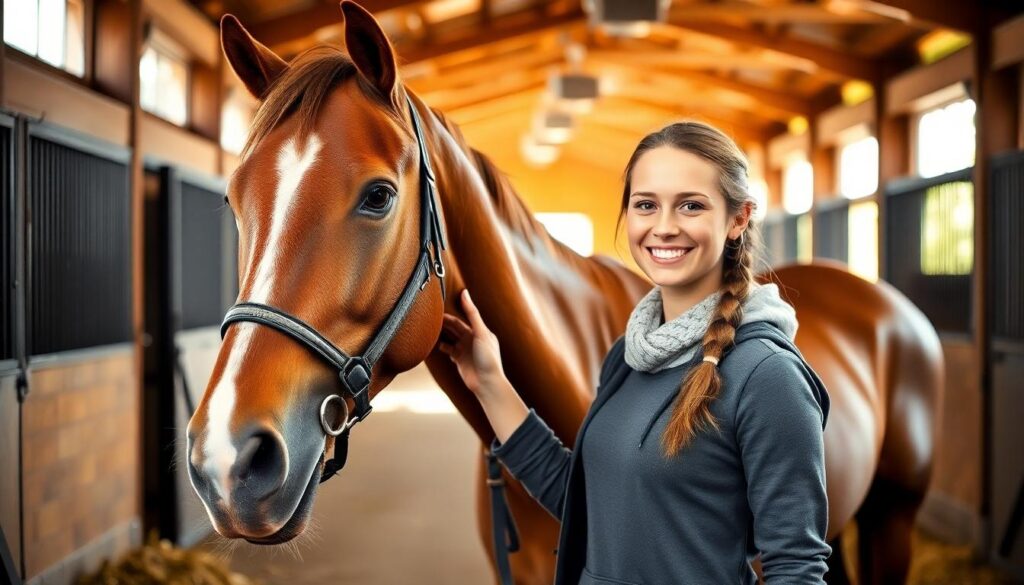Looking for some horse-arious humor to brighten your day? We’ve rounded up the most unbridled collection of horse jokes and puns that’ll have you laughing out loud. Whether you’re a seasoned equestrian or just someone who appreciates good wordplay, these jokes are sure to stirrup some laughter.
10 Hilarious Horse Jokes That Will Have You Horsing Around
- Why don’t horses go to work? They’re always feeling a little hoarse! This classic wordplay never fails to bring a smile to any equestrian’s face.
- What do you call a horse that lives next door? A neigh-bor! Your friends will surely chuckle at this simple yet effective pun that plays on a horse’s distinctive sound.
- Why did the pony get sent to his room? He wouldn’t stop horsing around! Parents and children alike will appreciate this family-friendly joke that’s perfect for all ages.
- How do horses stay in shape? They exercise at the stable gym! Fitness enthusiasts will particularly enjoy this clever joke that combines workout culture with equestrian life.
- What’s a horse’s favorite TV show? Neigh-ked and Afraid! This adult-oriented joke puts a funny spin on a popular survival reality show.
- Why couldn’t the horse sing a lullaby? She was a little hoarse! This sweet joke works wonderfully in family settings and brings together music and horse humor.
- What did the horse say after falling? I’ve fallen and I can’t giddyup! Combining classic phrases with horse terminology creates an instantly recognizable punchline that lands every time.
- How does a horse introduce its mother? “This is my mare!” The dual meaning here offers a clever wordplay that horse lovers immediately understand.
- What do you call a well-educated barnyard animal? A stable genius! This joke works on multiple levels with its clever reference to both a horse’s home and intelligence.
- Why did the horse go behind the tree? To change his jockeys! This slightly cheeky joke adds some playful adult humor to round out our collection of equine comedy.
Why Horse Humor Is a Stable Source of Laughter
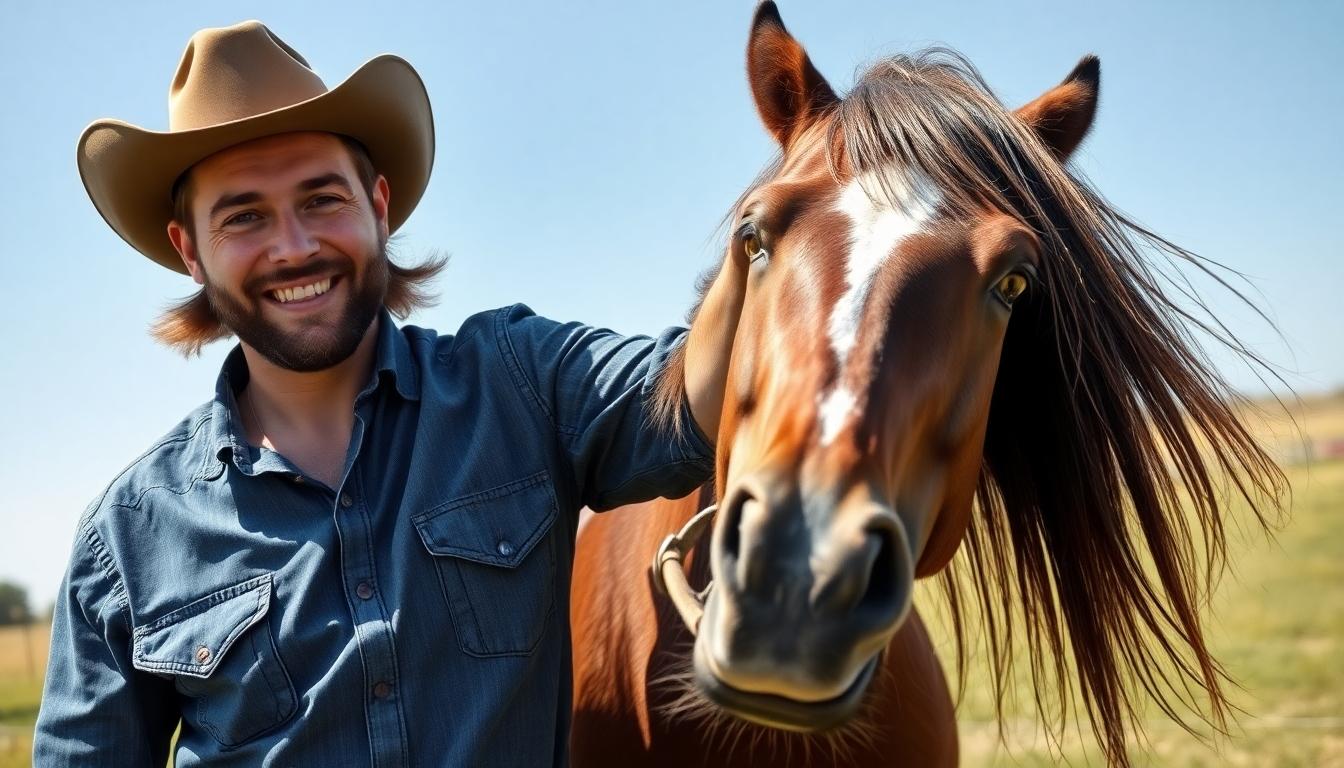
Horse humor gallops ahead in popularity because it leverages wordplay with familiar equestrian terms like “hoof,” “neigh,” “mane,” and “stable.” These puns create an instant connection through their simplicity and unexpected twists that trigger laughter through cognitive surprise.
The Psychology Behind Animal Puns
Animal puns work by capitalizing on linguistic ambiguity, requiring our brains to reinterpret words in novel contexts. When you hear “My horse is a real neigh-sayer!” your brain processes both meanings simultaneously, activating reward centers upon resolving the wordplay. Horse puns specifically benefit from dual processing—substituting “neigh” for “nay” creates a satisfying cognitive puzzle. Research indicates this mental resolution triggers pleasure responses in the brain, explaining why we find these jokes so enjoyable. Animal-exact humor further enhances emotional connections through anthropomorphism, as we attribute human characteristics to horses in jokes.
Why Horses Make Perfect Joke Subjects
Horses stand out as ideal comedic subjects due to their widespread cultural prominence across agriculture, sports, and recreation. Their recognizable physical features (manes, hooves) and distinctive behaviors (galloping, neighing) provide abundant material for creative metaphors. Consider jokes like “Why do horses make great comedians? They always hoof it up!”—these land effectively because most people understand the references without explanation. Horse-related idioms such as “straight from the horse’s mouth” also create familiar ground for joke construction, making the humor more accessible to diverse audiences. The structured nature of traditional “horseplay” offers a perfect framework for humor that balances predictability with absurdity, keeping jokes both relatable and surprising.
Neigh-ver Heard Before: Original Horse One-Liners
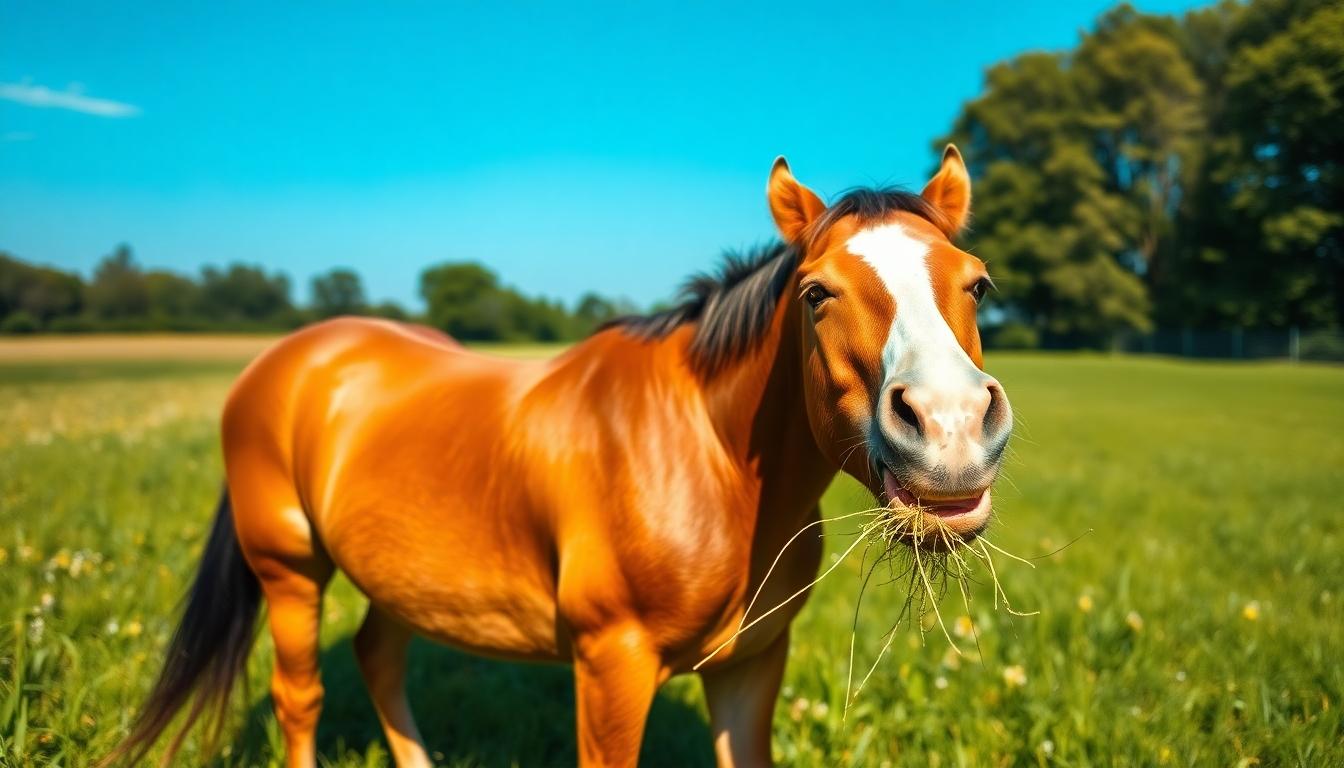
Looking for some fresh equine humor? These original horse one-liners will have you laughing out loud with their clever wordplay and unexpected punchlines.
Did you know horses have a secret jockey-changing habit? Why did the horse go behind the tree? He wanted to change his jockeys! This playful joke captures the mischievous side of our equine friends.
Living next to horses can be quite entertaining. What do you call a horse that lives next door? A neigh-bor! It’s a simple yet effective pun that plays on the distinctive sound horses make.
Some horses are known for their pessimistic outlook. Ever heard of a horse with negative vibes? He always says “Nay.” This joke cleverly uses the homophone between a horse’s “neigh” and the negative response “nay.”
Horses have their clumsy moments too. What did the horse say when it fell? “I’ve fallen and I can’t giddy up!” This hilarious twist on a classic phrase perfectly captures equine humor at its finest.
Short and Sweet Horse Jokes
A pony visited the doctor complaining about having a sore throat. The doctor’s diagnosis? “It’s OK, you’re just a little horse.” This veterinary pun plays wonderfully on the dual meaning of “hoarse” and “horse.”
Television preferences vary among equines. What’s a horse’s favorite TV show? Neighbours! This joke works on multiple levels, especially considering horses’ social nature.
Parking troubles affect everyone, even our four-legged friends. Why did the horse get a parking ticket? He didn’t have a horse permit! This urban scenario adds a modern twist to classic horse humor.
Eating habits can reveal a lot about an animal. What’s black and white and eats like a horse? A zebra. This simple riddle highlights the biological connection between horses and their striped relatives.
Clever Wordplay for Horse Lovers
Musical talents extend to the equine industry too. What happened when the horse decided to learn the violin? He became the fiddler on the hoof! This clever adaptation of the classic musical title shows how horse terms can transform familiar phrases.
Horses have their own greeting customs. How do horses greet each other? “Hay there!” This pun connects their food source with a common hello, creating a perfect equine salutation.
Dietary satisfaction makes for happy horses. Why was the horse so happy? He was on a stable diet! This double meaning plays on both consistent eating habits and their living quarters.
Mathematical abilities aren’t just for humans. What do you call a horse that’s good at math? A calculhorse! This blend of “calculator” and “horse” creates an unexpected and delightful punchline for math enthusiasts and horse lovers alike.
Horsing Around: Funny Puns for Equestrian Enthusiasts
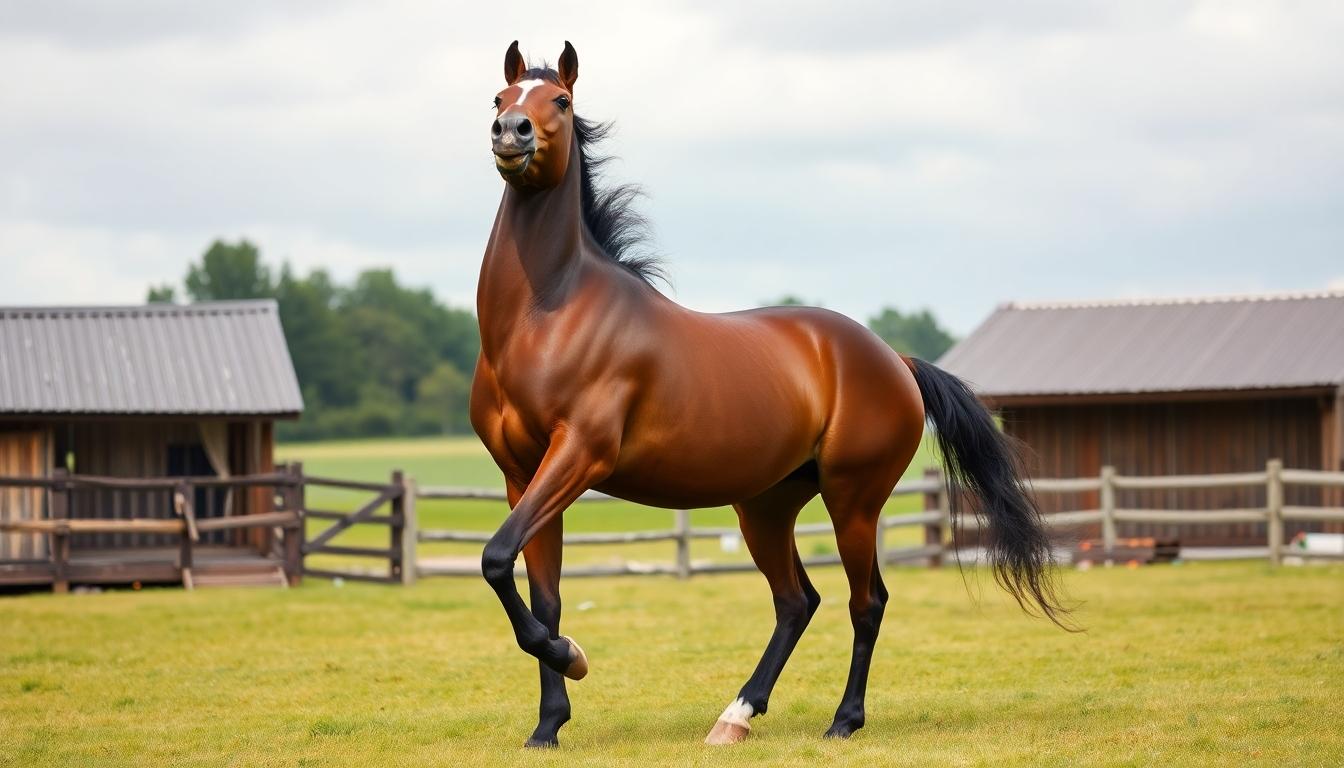
Riding-Related Humor
- A horse walks into a bar and says, “I’ll have a glass of water.” The bartender replies, “Neigh-sayers can’t drink!” This classic setup delivers a playful twist on the familiar “walks into a bar” joke format.
- Why are horses always calm? Because they know how to rein in their emotions! This clever wordplay uses the equestrian term “rein” to create a double meaning about emotional control.
- What do you call a horse that lives next door to a music studio? A neigh-bor with good beats! This pun combines the horse sound “neigh” with “neighbor” while adding a musical element that makes it even more delightful.
Stable and Pasture Puns
- Why did the young horse become a social media sensation? He had too many stable followers! This modern joke cleverly transforms the concept of a horse’s home into a play on social media terminology.
- What happened when the horse decided to learn the violin? He became the fiddler on the hoof! This witty pun reimagines the classic “fiddler on the roof” with an equestrian twist.
- What do you call a horse that doesn’t have any clothes? Neigh-ked! This cheeky joke combines the horse sound with a playful reference that’s sure to get a laugh.
More Equestrian Puns
- Why did the horse prefer the sportscar? It had full horse-power! This pun cleverly references the automotive term that originally came from comparing engine strength to actual horses.
- Where do horses go when they’re sick? The horsepital! This simple but effective wordplay combines “horse” and “hospital” for an instantly memorable pun.
- What’s a horse’s favorite gym exercise? The gallop poll! This clever joke combines the horse’s natural movement with a play on the term “gallup poll,” creating a perfect equestrian fitness pun.
Kid-Friendly Horse Jokes to Share at the Barn
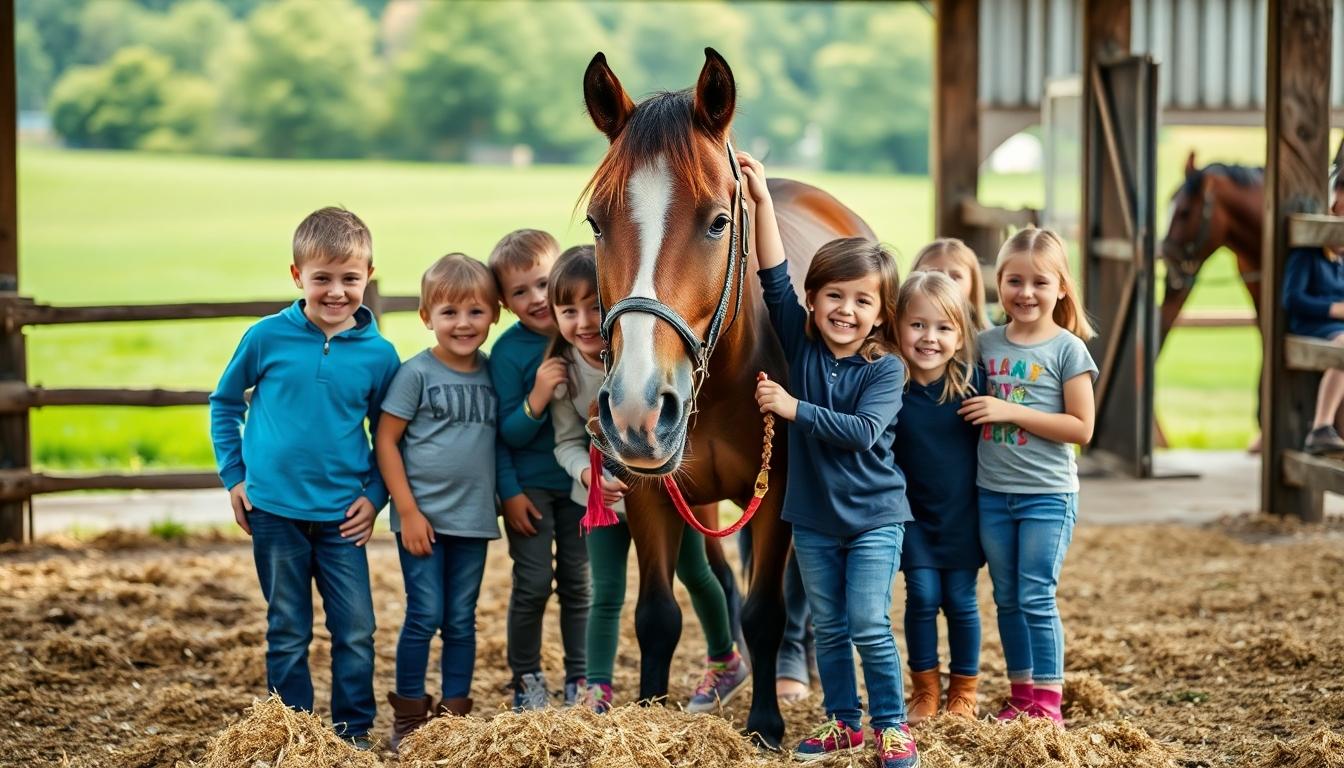
These clean, family-friendly horse jokes are perfect for sharing with young riders at the barn or during equestrian events.
Clean Jokes for Young Equestrians
- Meet the Neighbor: What do you call a horse that lives next door? A neigh-bor!
- Roadside Attraction: Why did the horse cross the road? Because someone shouted hay!
- Health Concerns: What disease was the horse scared of getting? Hay fever!
- Racing Champion: What do you call a horse that can’t lose a race? A shooin’ star!
- Tumble Trouble: What did the horse say when it fell? “I’ve fallen and I can’t giddyup!”
- Motivational Methods: What’s the best way to lead a horse to water? With lots of apples and carrots!
Horse Riddles for Children
- Leg Length Question: How long should a horse’s legs be? Long enough to reach the ground.
- Hairy Situation: Which side of a horse has the most hair? The outside!
- Late Night Equine: What do you call a horse that likes to stay up late? A nightmare!
- Weather Warning: How do horses stay cool in summer? They use barn fans!
- Smart Transport: Why are horses so good at math? They always know when to add a saddle to their equation!
Horse Jokes That Will Stirrup Your Sense of Humor
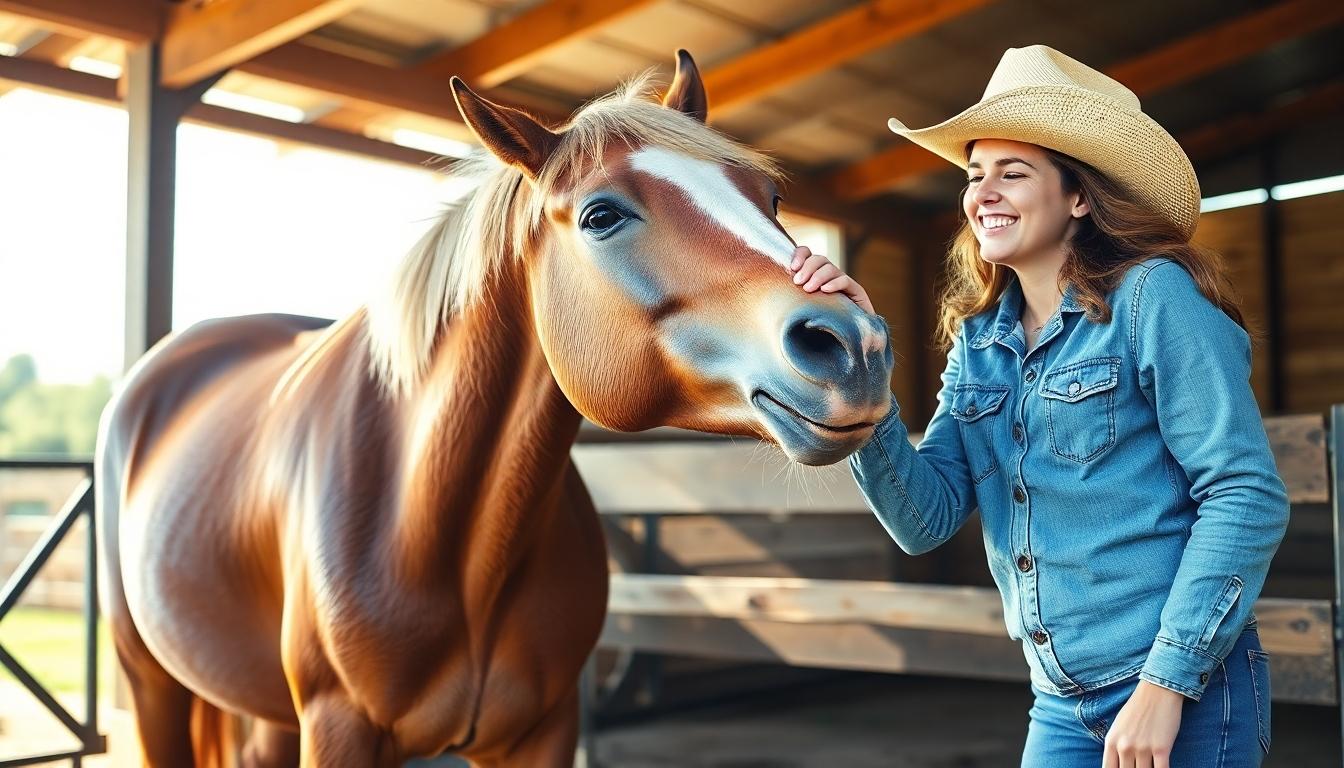
Looking for some equine humor to brighten your day? We’ve collected the most amusing horse jokes that are guaranteed to make you chuckle and neigh with laughter.
Classic Horse Humor
The timeless “A horse walks into a bar…” joke never fails to entertain with the bartender’s iconic response: “Why the long face?” This quintessential horse joke plays on the animal’s distinctive facial structure while suggesting emotional distress.
Horse humor often relies on literal interpretations of common phrases. Consider this gem: “I put a bet on a horse to come in at 10 to 1 – and it did.” The punchline works by treating the odds as an actual time rather than betting odds.
Have you heard about the runaway horse? It’s a terrible tale of WHOA! This joke cleverly uses the command used to stop horses as its punchline, creating an amusing play on words that resonates with anyone familiar with basic horse handling.
Sophisticated Equine Wordplay
Equestrian vocabulary offers fertile ground for creative puns and wordplay. Stable-related humor includes classics like “Trying to horse around but I’m just not stable enough,” which plays on both the literal housing for horses and emotional stability.
Musical references make for harmonious horse jokes too. “My horse is a fantastic musician; he has a great trot signature” cleverly combines the horse’s movement with musical terminology, creating a sophisticated pun that music-loving equestrians appreciate.
Food and drink puns add flavor to equine humor. References to “thorough-bread” instead of “thoroughbred” or offering a “hay-tini” instead of a martini showcase how everyday concepts can be transformed into horse-related wordplay that brings smiles to those who appreciate creative linguistics.
Health-related horse humor never goes out of style. “Where do horses go when they’re sick? The horsepital” combines medical settings with equine terminology in a way that’s both obvious and delightful in its simplicity.
Jokes Only Horse Owners Will Understand
Equipment-based humor resonates deeply with those who spend time in barns and stables. “Why did the horse prefer the sportscar? It had full horse-power!” This joke lands particularly well with equestrians who understand the intersection of automotive terminology and actual equine strength.
Racing humor creates a special connection among those involved in competitive riding. Jokes about boastful racehorses claiming “In the last 15 races, I’ve won eight!” capture the competitive spirit many owners recognize in their athletic equines.
Jockey jokes add another dimension to horse humor. “Why should you never be rude to a jump jockey? In case he takes offence” plays on both the literal racing obstacle and the potential for emotional offense, creating a multilayered joke that horse racing enthusiasts particularly enjoy.
Exercise-themed horse humor provides another rich vein of comedy. “What’s a horse’s favorite gym exercise? The gallop poll!” combines political terminology with a horse’s natural movement in a way that creates an unexpected and amusing mental image.
Communication jokes resonate with riders who understand horse behavior. “Why don’t racehorses talk mid-race? They don’t want to stirrup trouble” incorporates riding equipment terminology while acknowledging the focus needed during competition, making it especially amusing to those who’ve experienced the intensity of equestrian sports.
How to Incorporate Horse Puns Into Everyday Conversation

Horse puns can liven up any conversation when used strategically. We’ve gathered some clever ways to incorporate equine humor into your daily interactions that will surely get a laugh.
Breaking the Ice at Equestrian Events
When attending horse shows or equestrian gatherings, light and relatable humor works best. Start with a simple joke like “Did you hear about the horse who became a violinist? He’s now the fiddler on the hoof!” This type of opener instantly creates a shared moment of amusement. Event-exact puns can also work wonders – try commenting that the venue is perfect because it even has a “bridle suite” for newlyweds. Self-deprecating humor adds approachability to your interactions, so don’t hesitate to mention you’re there to “stable-lize” your networking skills. These conversational ice-breakers establish common ground while demonstrating your appreciation for the equestrian industry.
Horse Humor for Social Media
Social platforms offer fertile ground for equine wordplay. Visual content paired with clever captions works exceptionally well – try posting a horseshoe image with the caption “Some poor horse is only wearing socks!” Hashtags amplify your pun power, so incorporate trending tags like #NeighSayers or #HorsePowerHumor alongside jokes such as “Why did the sick pony visit the doctor? He was a little horse!” Engagement increases when you involve your audience directly, so create interactive posts like “Tag someone who needs a mane squeeze today! 🐴 #HorsePuns.” Timing matters for maximum impact – posting during major equestrian events can attract more attention from horse enthusiasts who appreciate your clever wordplay.
In everyday situations, situational humor often yields the best results. During meals, you might mention that “This soup needs cough stirrup—it’s too bland!” While shopping with friends, suggest they “rein in that budget before they go hoof it at the mall.” Compliments can also be enhanced with equine flair – telling someone “You’re such a stallion at problem-solving!” adds playfulness to your praise while highlighting their abilities.
Galloping Through History: Classic Horse Jokes

Horse jokes and puns have trotted through the centuries, becoming a beloved part of equestrian culture. These timeless quips continue to bring smiles to horse enthusiasts and casual joke-lovers alike.
Traditional Horse Humor
The classic “horse walks into a bar” joke has spawned countless variations, with bartenders typically responding “Why the long face?” – a pun that plays perfectly on equine facial features. We’ve collected some of these traditional gems that have stood the test of time in horse humor circles. One particularly clever joke involves a horse named Friday, which explains how a rider could travel to town and back on the same day without creating any paradox.
Wordplay forms the foundation of traditional horse humor, with puns that are both groan-worthy and brilliant. Calling a horse that lives next door your “neigh-bor” remains one of the most popular equine puns around. Job-related horse jokes also gallop through conversations, like the one about a horse applying for a job because it was seeking a “stable career.”
Veteran horse jokes that have been shared around stables for generations include the classic one-liner where a fallen horse exclaims, “I’ve fallen and I can’t giddyup!” These jokes connect with audiences through their clever use of horse terminology and relatable situations.
Vintage Equestrian Comedy
Vintage horse humor often relies on characterization and personality traits ascribed to horses. Jokes from yesteryear typically capitalize on equine behaviors and physical traits in ways that create instant recognition and laughter.
A prime example from the annals of equestrian comedy labels a horse with a bad attitude as a “night-mare” – combining the fear-inducing “nightmare” with the term for a female horse. We find these plays on words particularly effective because they connect everyday expressions with horse-exact terminology.
Another vintage joke that continues to delight features a horse using a “stable keyboard” on a computer, blending modern technology with traditional equestrian settings. These humorous anecdotes appeal to diverse audiences from casual horse fans to dedicated equestrians, showcasing the creative linguistic gymnastics that make horse humor uniquely entertaining.
When Horse Jokes Fall Flat: Avoiding the Long Face
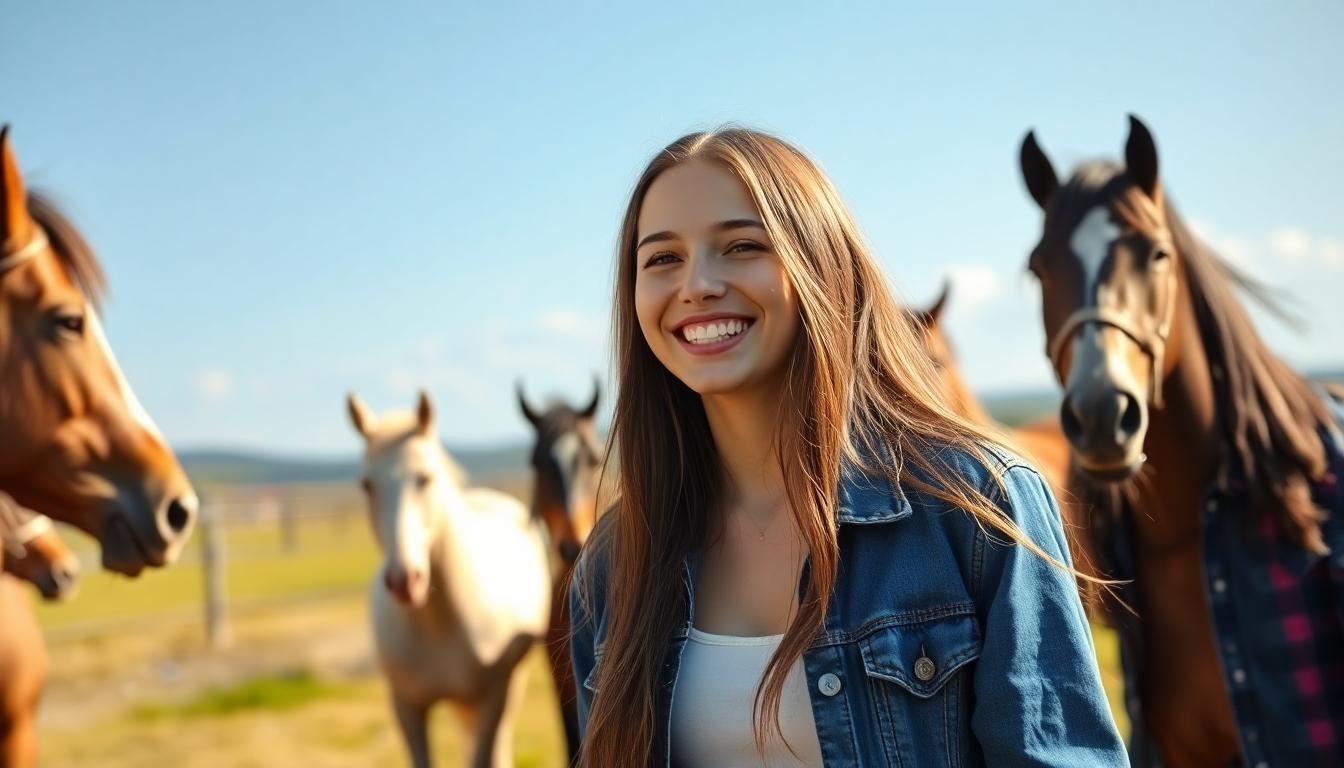
Even the best horse jokes can stumble if not delivered properly. Understanding when and how to share your equine humor can mean the difference between hearty laughter and awkward silence.
Reading Your Audience
The success of horse jokes largely depends on who’s listening. We’ve found that tailoring your jokes to match your audience’s age and familiarity with horses significantly improves reception. Children typically enjoy simple, playful puns like calling a horse that loves telling jokes a “punny pony.” Horse enthusiasts appreciate more sophisticated wordplay involving exact equestrian terminology. People unfamiliar with horses might not catch references to specialized equipment or riding techniques, so it’s best to stick with broader concepts they’ll recognize. Gauge your listeners’ reactions after your first joke to determine if you should continue with more horse humor or switch topics. Paying attention to social cues helps ensure your jokes create connection rather than confusion.
Knowing When to Rein It In
Overusing horse puns can quickly make your humor fall flat. We recommend limiting yourself to two or three horse jokes in a single conversation to maintain their impact. Watch for signs that your audience has had enough, such as forced smiles or changing the subject. Some situations simply aren’t appropriate for horse humor, particularly formal settings or serious discussions. The best approach is to use horse jokes sparingly as seasoning rather than the main course of your conversation. Even the funniest equine wordplay loses its charm when repeated excessively, leaving your audience with a genuine “long face.” Timing matters tremendously—a well-placed horse joke can lighten the mood, but knowing when to stop prevents your humor from becoming a burden rather than a delight.
Conclusion: Why Horse Humor Never Goes Out of Style
Horse jokes and puns have endured for generations because they tap into something universal. There’s an undeniable charm in equine humor that transcends age demographics and cultural backgrounds.
Whether you’re an experienced equestrian or someone who’s never mounted a saddle we hope these jokes have brought a smile to your face. The beauty of horse humor lies in its accessibility – from sophisticated wordplay for the aficionados to simple puns that make children giggle.
So next time you’re feeling a little “horse” remember that laughter is the best medicine. Share these jokes with fellow horse lovers or use them to break the ice at your next stable visit. After all the “mane” reason we love horse humor is that it brings us together through shared laughter!
Frequently Asked Questions
Why are horse jokes so popular?
Horse jokes are popular because they rely on simple wordplay with familiar equestrian terms like “neigh,” “hoof,” and “stable.” They create instant connections through linguistic ambiguity that triggers pleasure responses in the brain. Horses’ cultural prominence and recognizable features make the humor accessible to wide audiences, balancing predictability with absurdity for maximum appeal.
What makes a good horse joke?
A good horse joke combines clever wordplay, unexpected punchlines, and relatable equine references. The best jokes balance familiarity with surprise, using recognizable terms like “neigh” or “stable” in creative ways. Effective horse humor works on multiple levels, appealing to both casual audiences and dedicated equestrians while remaining light-hearted and accessible.
Can horse jokes be appropriate for all ages?
Yes, most horse jokes are family-friendly and suitable for all ages. The article features jokes ranging from simple puns for children to more sophisticated wordplay for adults. The clean nature of equine humor makes it versatile for various settings, though some jokes may include cheeky adult references. Overall, horse humor offers something for everyone regardless of age.
What’s the most famous horse joke of all time?
The classic “A horse walks into a bar, and the bartender asks, ‘Why the long face?'” is widely considered the most famous horse joke. Its enduring popularity comes from the perfect blend of situational humor and wordplay based on a horse’s physical appearance. This joke has spawned countless variations and remains instantly recognizable across generations.
How can I use horse jokes in everyday conversation?
Incorporate horse jokes as ice-breakers at equestrian events or when the conversation naturally turns to animals. Use them sparingly in social media captions with relevant hashtags to engage audiences. For maximum effect, match the joke to your audience’s knowledge of horses, and don’t overuse them—timing is everything for successful humor.
Are there different categories of horse jokes?
Yes, horse jokes fall into several categories: wordplay using equine terms, situation-based humor, equipment jokes for enthusiasts, racing and competition jokes, and behavior-based humor. Some jokes play on horse communication (“neigh” puns), while others focus on stable life, riding experiences, or food references like “hay” and “oats.”
Do horse owners appreciate different jokes than casual audiences?
Horse owners tend to appreciate more nuanced jokes that reference specific equestrian experiences, equipment, and horse behaviors. They might enjoy humor about tacking up, mucking stalls, or training challenges that wouldn’t resonate with general audiences. However, basic wordplay jokes using terms like “neigh” and “stable” have universal appeal regardless of horse experience.
What’s the psychology behind laughing at animal puns?
Animal puns trigger laughter through cognitive surprise and the pleasure of solving simple linguistic puzzles. When we hear a horse pun, our brains simultaneously process multiple meanings of words like “stable” or “hoarse/horse,” creating a mental reward when we understand the joke. This cognitive processing activates pleasure centers in the brain, explaining why even simple puns can bring joy.

